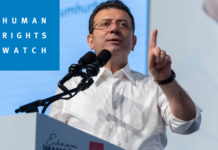A leading human rights organization has documented at least 26,632 rights violations in Turkish prisons in 2024, citing overcrowding, denial of medical care, torture and systemic discrimination of vulnerable groups, including women, LGBTQ+ individuals and people with disabilities.
The annual report, released Tuesday by the Human Rights Association (İHD), states that the number of violations is likely only a fraction of the actual total as the organization can only document cases it receives directly via letters, attorney visits or appeals from family members.
According to the report, Turkey’s prison population had surged to 378,657 by the end of 2024, well above the official capacity of 299,042, marking an increase by a factor of 5.4 since 2000. Despite the opening of 12 new prisons last year and plans to build 11 more in 2025, overcrowding continues to worsen. The occupancy rate now exceeds 126 percent, which the report characterizes as a systemic violation of detainees’ human rights and disregard for the principle that pretrial detention should be the exception, not the rule.
Among the most disturbing findings are the cases of sick prisoners. The İHD identified at least 1,412 inmates in poor health, 335 of whom are classified as seriously ill. Many of them are unable to meet their basic needs independently. Despite medical reports affirming their condition, some are denied release. The report accuses the Council of Forensic Medicine (ATK) of making politically motivated decisions in cases involving political prisoners, refusing to endorse their release even when multiple medical assessments confirm that continued detention threatens their lives.
The report details multiple instances in which inmates suffering from cancer, advanced neurological disorders or mobility impairment were either denied treatment or forced to wait months for the care of a specialist. Transport to hospitals is also cited as a major issue, with patients often being moved in cramped and degrading conditions. Many are subjected to humiliating body searches or denied medical attention altogether due to their refusal to comply with what the report describes as “inhumane demands,” such as being forced to walk barefoot or undergo oral cavity searches.
The report also outlines cases of torture, ill-treatment and degrading conduct by prison staff. Prisoners reported being subjected to beatings, threats and discriminatory treatment. In some facilities inmates were allegedly coerced into becoming informants under duress. Strip-searches, forced standing for roll calls, denial of outdoor time and raids that destroyed personal property were also commonly reported.
Vulnerable populations are disproportionately affected. There are currently 780 children under the age of 6 residing in prisons with their mothers. Women, especially those with serious health needs or disabilities, reportedly face inadequate facilities and a lack of appropriate medical and psychological support. LGBTQ+ prisoners were subjected to isolation, verbal abuse and denial of hormone treatment. Foreign nationals and disabled inmates also appear to face additional barriers in accessing basic services.
The report also highlighted a surge in hunger strikes during 2024 as a form of protest against mistreatment and arbitrary disciplinary measures. Inmates participating in these actions reported retaliation, such as solitary confinement or denial of the right to communicate with family, legal counsel and others.
Communication and information access remain heavily restricted across many facilities. Inmates reported being denied access to books, news sources and even correspondence with family members. In several cases, letters and legal documents were either censored or not delivered at all. The İHD claims that prison administrations use arbitrary disciplinary investigations to punish and silence inmates who speak out.
Living conditions inside prisons were another major concern. The report documented poor nutrition, with food often described as insufficient, non-nutritious, or contaminated. Access to clean water is limited and often comes at a cost, while heating and ventilation systems are frequently inadequate. Overcrowding forces many inmates into unhygienic and unsafe shared spaces, exacerbating the spread of illness.
The report emphasizes that these conditions are particularly dangerous for the country’s aging prison population. More than 5,500 inmates are over the age of 65, and many face significant health risks due to poor care and insufficient accommodations.
The İHD also criticized the government’s legal framework, particularly the implementation of parole and sentence deferral mechanisms, which it says are not applied equitably. According to the group, a 2023 Ministry of Justice directive meant to facilitate the release of seriously ill inmates is rarely enforced in practice.
Finally, the report criticized the Turkish government’s refusal to release regular statistical data on vulnerable inmate populations, including political prisoners, LGBTQ+ individuals and seriously ill inmates. The lack of transparency, the group argued, hinders independent oversight and perpetuates a culture of impunity within the penal system.















